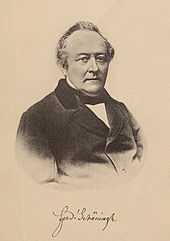Ferdinand Schöningh (publisher, 1815)
Ferdinand Schöningh (born March 16, 1815 in Meppen , † August 18, 1883 in Paderborn ) was a German bookseller , publisher and publicist .
Life
Ferdinand Friedrich Joseph Schöningh came from a family of lawyers and medical professionals based in Emsland and the Netherlands . He grew up as the second of seven children until 1831 in Meppen and attended the local high school up to the fourth .
His father Dr. jur. Henricus Jacobus Schöningh (born January 10, 1782 in Ootmarsum , Province of Overijssel , † October 6, 1833 in Meppen) was bailiff of the Meppen office in the Duchy of Arenberg-Meppen , his mother Josephine Coppenrath (born October 19, 1789 in Münster , † 31. March 1851 in Meppen) was the eldest daughter of the Munster bookseller and publisher Joseph Heinrich Coppenrath (1761-1853).
His older brother Josef Schöningh followed the family tradition of his father and became the chief arenbergischer judge at the higher court in Meppen .
His younger brother Eduard Schöningh (officer) served as a professional officer in the naval artillery of the Imperial and Royal Navy and returned to Meppen in 1867 after his departure. Eduard Schöningh is seen in the Emsland as the founder of the Schöninghsdorf moor colony. The establishment and financing of the Schöninghsdorf project can, however, be ascribed at least to the same extent to Ferdinand Schöningh.
Ferdinand Schöningh learned the trade of bookseller in the tradition of the maternal family. In 1831 he began training with his grandfather Joseph Heinrich Coppenrath in Münster (Westphalia). In the book and art shop Coppenrath he worked for four years as an apprentice and seven more years as an assistant.
On October 5, 1848, he married Sophie Overweg (1826–1905) from Soest . With her he had four children, Maria, Ferdinand (1856–1925), Anna and Joseph.
On August 18, 1883, the publisher suddenly and unexpectedly died of "blow".
Services
In 1842 Ferdinand Schöningh took over the management of the Nasse'schen Buchhandlung in Soest as managing director and led this company to economic success. On May 12, 1847, he founded the Ferdinand Schöningh book and art dealership in Paderborn, from which the Ferdinand Schöningh publishing house emerged.
During Schöningh's lifetime, this publishing house developed into one of the most important Catholic publishers for theological, scientific, educational and aesthetic literature in northern Germany. Among the authors of the publishing house in the 19th century were the poets Joseph von Eichendorff and Ferdinand Freiligrath, who are still known today, as well as the well-read authors Friedrich Wilhelm Grimme and Friedrich Wilhelm Weber , whose verse epic Dreizehnlinden became a bestseller with over 750,000 copies sold.
The publisher also published the poems of Luise Hensel , poet of the evening song “ I am tired, go to rest ”, and the works of the Westphalian poet Antonie Jüngst .
In 1848 F. Schöningh founded the Westfälisches Kirchenblatt for Catholics , which appeared weekly, and in 1849 the daily newspaper Westfälisches Volksblatt . With these newspapers, which he also edited at the beginning, he gave political Catholicism, to which he was closely connected, a voice in eastern Westphalia.
Since 1864 he was an elected participant of the Soest Conferences at which the Soest program of the Center Party was developed. These meetings took place in the hotel of his father-in-law Gustav Overweg.
literature
- Ferdinand Schöningh, A picture of life as a commemorative publication for the 50th anniversary of the bookstore founded by the Eternal in Paderborn on May 12, 1897 . Schöningh, Paderborn 1897. ( ULB Münster )
- Verlag Ferdinand Schöningh 1847–1997 , Schöningh, Paderborn 1997.
- Schöningh sin Dbod, 1876 1976, 100 years Schöninghsdorf , Verlag Ferdinand Schöningh, Paderborn 1976.
- Schöningh, Ferdinand. In: Rudolf Schmidt : German booksellers. German book printer. Volume 5. Berlin / Eberswalde 1908, pp. 857-861. ( Digitized at zeno.org )
- Wilhelm Schulte: Ferdinand Schöningh In: Westphalian heads , Aschendoff, Münster 1963, p. 283 f.
- Karl Friedrich Pfau : Schöningh, Ferdinand . In: Allgemeine Deutsche Biographie (ADB). Volume 54, Duncker & Humblot, Leipzig 1908, p. 156 f.
- Karl-Joseph Hummel : Schöningh (publisher). In: New German Biography (NDB). Volume 23, Duncker & Humblot, Berlin 2007, ISBN 978-3-428-11204-3 , p. 416 f. ( Digitized version ).
- Friedrich Gerhard Hohmann: "The Soester Conferences 1864-1866. On the prehistory of the Center Party in Westphalia." P. 311 f.
Web links
Individual evidence
- ↑ [1]
- ^ Karl-Joseph Hummel: Schöningh (publisher). In: New German Biography (NDB). Volume 23, Duncker & Humblot, Berlin 2007, ISBN 978-3-428-11204-3 , p. 416 f. ( Digitized version ).
- ^ [2] Friedrich Gerhard Hohmann: "The Soester Conferences 1864-1866. On the prehistory of the Center Party in Westphalia." P. 311 f.
| personal data | |
|---|---|
| SURNAME | Schöningh, Ferdinand |
| ALTERNATIVE NAMES | Ferdinand Schöningh I |
| BRIEF DESCRIPTION | German publisher |
| DATE OF BIRTH | March 16, 1815 |
| PLACE OF BIRTH | Meppen |
| DATE OF DEATH | August 18, 1883 |
| Place of death | Paderborn |
